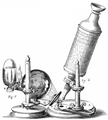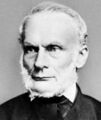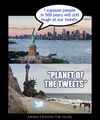January 2: Difference between revisions
(Created page with "{{Selected anniversaries/December 2}}") |
No edit summary |
||
| Line 1: | Line 1: | ||
{{Selected anniversaries/ | {{Selected anniversaries/January 2}} | ||
Revision as of 18:24, 12 November 2018
1665: Samuel Pepys sees a copy of Robert Hooke’s Micrographia at his bookseller and orders a copy. Pepys writes in his diary: "Thence to my bookseller's and at his binder's saw Hooke's book of the Microscope, which is so pretty that I presently bespoke it."
1822: Rudolf Clausius born. He will be one of the central founders of the science of thermodynamics.
1892: Mathematician and astronomer George Biddell Airy dies. His achievements include work on planetary orbits, measuring the mean density of the Earth, and, in his role as Astronomer Royal, establishing Greenwich as the location of the prime meridian.
1904: Physicist and chemist Walter Heinrich Heitler born. He will make contributions to quantum electrodynamics and quantum field theory, bringing chemistry under quantum mechanics through his theory of valence bonding.
1905: Mathematician Lev Schnirelmann born. He will prove that any natural number greater than 1 can be written as the sum of not more than C prime numbers, where C is an effectively computable constant.
1920: Writer Isaac Asimov born. He will be considered one of the "Big Three" science fiction writers during his lifetime.
1959: Luna 1, the first spacecraft to reach the vicinity of the Moon and to orbit the Sun, is launched by the Soviet Union.
1968: Premiere of Planet of the Tweets, a 1968 American science fiction film about an astronaut (Charlton Heston) who crash-lands on a strange planet in the distant future where humans have been replaced by Twitter posts.
2004: The robotic spacecraft Stardust flies by comet Wild 2, collecting dust samples which will return to Earth on 15 January 2006.








